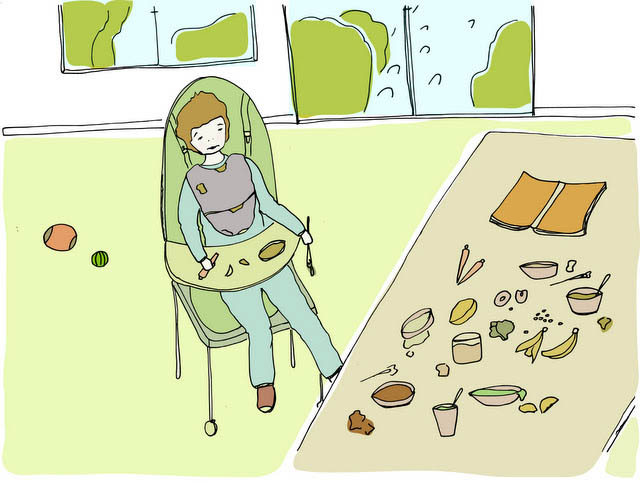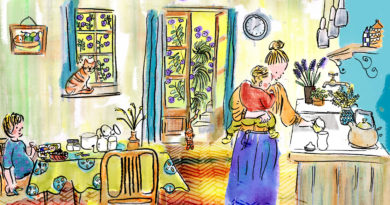Cooking for and with Children
 Food holds a central role in all of our lives. We spend a good part of each day planning, preparing, eating, and socializing over our meals, and your child will undoubtedly want to make his individual contributions to the family dinners. In the beginning, these contributions will be purely passive, but small babies tend to grow quickly, and your little one soon will want to help actively with the food preparation and with the dinnertime conversation.
Food holds a central role in all of our lives. We spend a good part of each day planning, preparing, eating, and socializing over our meals, and your child will undoubtedly want to make his individual contributions to the family dinners. In the beginning, these contributions will be purely passive, but small babies tend to grow quickly, and your little one soon will want to help actively with the food preparation and with the dinnertime conversation.
Immediately after your baby is born, let your mother cook for you, if possible, while you take the time to bond and rest with the new arrival, and to learn his signals. These include: when he needs to be cuddled (almost the whole day, snuggled in your arms, in a sling, or sleeping beside you), when he needs to pee, when he feels too hot or too cold, and when he needs to be breastfed (again, this will seem to be almost constant when the baby is very small, as he does his job filling his tummy and making sure that your breasts are kept empty, thus encouraging a good milk supply and discouraging engorgement). After you and your baby have settled in, you will have to start slowly getting back to tending to the household chores – keeping it simple and doing the minimum possible at first – and to cooking family meals.
For about the first six months of his life, your baby needs only your good breastmilk. This is the perfect food for your baby, its unique composition being continuously adapted to your baby’s individual needs. How then cooking “for and with” Baby? Although Baby is not yet eating any solids, the tastes of what you eat get into your breastmilk, so cooking for yourself is, in essence, cooking for your baby. This is the time when your baby’s tastes and preferences are being programmed to fit with the family’s dietary preferences. To start your child off on a lifetime of good nutrition, it is best to maintain a healthy diet for yourself right from the beginning of his life. You will benefit from this as well, having plenty of energy and a bright outlook to dedicate to the tasks of each day. As for “cooking with” your baby, well, in the beginning your baby will seem to do nothing other than sleep and breastfeed, sometimes both at the same time! Be as flexible as possible, and take the opportunities that arise: cook “together” with your baby as he is sleeping in the sling! Keep it simple at first: a quick salad and a baked potato or perhaps a casserole or stew you prepared and stored in the freezer during your “nesting phase” in the last few weeks of your pregnancy.
When your child is a few months old, he will no longer be interested in helping only passively with the cooking but will want to take an active role. At this point, unless there is a physical impediment against it, you can start doing your food preparation Korean style: on the floor. Cutting boards, knives (keep an eye on these if your child is mobile already!), pots, pans, etc. can be taken down to the floor and your baby can “help” with the cooking by holding a wooden spoon or pot lid while you prepare the rest. Older babies who can sit up by themselves can wash lettuce in a basin filled with tepid water (and the floor and themselves in addition, so if you would rather not mop the floor before every meal, be sure to put a large bath towel underneath it all and perhaps strip the baby naked).
At about the age of six months, sometimes a bit earlier and often times a bit later, your baby will start to eat on his own. You will know that the time is right when he grabs something from your plate, shoves it into his mouth, chews, swallows, and goes back for more. Now more thought must be given to what you cook. If you or the baby’s father have a family history of allergies, introduce new foods slowly and look for signs of intolerance, but otherwise do not give too much thought to what you offer your child, with the exception of some small restrictions at the very beginning (no honey, non-human milk products, added salt, junk foods, etc.). Whatever you decide to feed your baby, be sure that it is a food that he can eat by himself, and be prepared to clean up a few messes in the first few months.
Older children love to help with any kind of cooking: adding flour to a cake batter, kneading bread dough, and even cutting up vegetables, starting with things like mushrooms and zucchini which are easily cut using a fruit knife (a blunt knife with a slender, yet unsharpened blade that allows it to cut nicely), and advancing to things like carrots and potatoes, which require the use of a sharp knife, as they grow more adept. After a while, your child will suggest a dinner menu on his own and will help shop for and prepare the food.
As I mentioned before, babies have a way of growing quickly. Before you know it, your baby may have a baby of his own, which brings us full circle: you can now cook for the new mother, thus giving her time to bond, rest with, and learn the signals of her new baby….
By Bethany Brupbacher
Bethany is an LLL Leader who runs monthly meetings in Zürich Oerlikon. A meeting schedule and her contact information can be found on the LLL Internet page.
Illustration by Laura Munteanu
Laura has studied Journalism and Advertising, and has been working as a journalist and an illustrator. She has been illustrating for magazines, websites, charity and diverse campaigns. She lives in Zurich with her husband and seven-year-old daughter.



